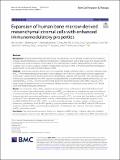| dc.contributor.author | Neo, Shu H. | |
| dc.contributor.author | Her, Zhisheng | |
| dc.contributor.author | Othman, Rashidah | |
| dc.contributor.author | Tee, Ching A. | |
| dc.contributor.author | Ong, Li C. | |
| dc.contributor.author | Wang, Yuehua | |
| dc.contributor.author | Tan, Irwin | |
| dc.contributor.author | Tan, Jaylen | |
| dc.contributor.author | Yang, Yanmeng | |
| dc.contributor.author | Yang, Zheng | |
| dc.contributor.author | Chen, Qingfeng | |
| dc.contributor.author | Boyer, Laurie A. | |
| dc.date.accessioned | 2023-10-06T15:34:52Z | |
| dc.date.available | 2023-10-06T15:34:52Z | |
| dc.date.issued | 2023-09-19 | |
| dc.identifier.uri | https://hdl.handle.net/1721.1/152384 | |
| dc.description.abstract | Abstract
Background
Mesenchymal stromal cells (MSCs) have broad potential as a cell therapy including for the treatment of drug-resistant inflammatory conditions with abnormal T cell proliferation such as graft-versus-host disease (GVHD). Clinical success, however, has been complicated by the heterogeneity of culture-expanded MSCs as well as donor variability. Here, we devise culture conditions that promote expansion of MSCs with enhanced immunomodulatory functions both in vitro and in animal models of GVHD.
Methods
Human bone marrow-derived MSCs were expanded at high-confluency (MSCHC) and low-confluency state (MSCLC). Their immunomodulatory properties were evaluated with in vitro co-culture assays based on suppression of activated T cell proliferation and secretion of pro-inflammatory cytokines from activated T cells. Metabolic state of these cells was determined, while RNA sequencing was performed to explore transcriptome of these MSCs. Ex vivo expanded MSCHC or MSCLC was injected into human peripheral blood mononuclear cells (PBMC)-induced GVHD mouse model to determine their in vivo therapeutic efficacy based on clinical grade scoring, human CD45+ blood count and histopathological examination.
Results
As compared to MSCLC, MSCHC significantly reduced both the proliferation of anti-CD3/CD28-activated T cells and secretion of pro-inflammatory cytokines upon MSCHC co-culture across several donors even in the absence of cytokine priming. Mechanistically, metabolic analysis of MSCHC prior to co-culture with activated T cells showed increased glycolytic metabolism and lactate secretion compared to MSCLC, consistent with their ability to inhibit T cell proliferation. Transcriptome analysis further revealed differential expression of immunomodulatory genes including TRIM29, BPIFB4, MMP3 and SPP1 in MSCHC as well as enriched pathways including cytokine–cytokine receptor interactions, cell adhesion and PI3K-AKT signalling. Lastly, we demonstrate in a human PBMC-induced GVHD mouse model that delivery of MSCHC showed greater suppression of inflammation and improved outcomes compared to MSCLC and saline controls.
Conclusion
Our study provides evidence that ex vivo expansion of MSCs at high confluency alters the metabolic and transcriptomic states of these cells. Importantly, this approach maximizes the production of MSCs with enhanced immunomodulatory functions without priming, thus providing a non-invasive and generalizable strategy for improving the use of MSCs for the treatment of inflammatory diseases. | en_US |
| dc.publisher | BioMed Central | en_US |
| dc.relation.isversionof | https://doi.org/10.1186/s13287-023-03481-7 | en_US |
| dc.rights | Creative Commons Attribution 4.0 International license | en_US |
| dc.rights.uri | https://creativecommons.org/licenses/by/4.0/ | en_US |
| dc.title | Expansion of human bone marrow-derived mesenchymal stromal cells with enhanced immunomodulatory properties | en_US |
| dc.type | Article | en_US |
| dc.identifier.citation | Stem Cell Research & Therapy. 2023 Sep 19;14(1):259 | en_US |
| dc.contributor.department | Singapore-MIT Alliance in Research and Technology (SMART) | |
| dc.contributor.department | Massachusetts Institute of Technology. Department of Biological Engineering | |
| dc.contributor.department | Massachusetts Institute of Technology. Department of Biology | |
| dc.identifier.mitlicense | PUBLISHER_CC | |
| dc.identifier.mitlicense | PUBLISHER_CC | |
| dc.eprint.version | Final published version | en_US |
| dc.type.uri | http://purl.org/eprint/type/JournalArticle | en_US |
| eprint.status | http://purl.org/eprint/status/PeerReviewed | en_US |
| dc.date.updated | 2023-09-24T03:14:30Z | |
| dc.language.rfc3066 | en | |
| dc.rights.holder | BioMed Central Ltd., part of Springer Nature | |
| dspace.embargo.terms | N | |
| dspace.date.submission | 2023-09-24T03:14:30Z | |
| mit.license | PUBLISHER_CC | |
| mit.metadata.status | Authority Work and Publication Information Needed | en_US |
